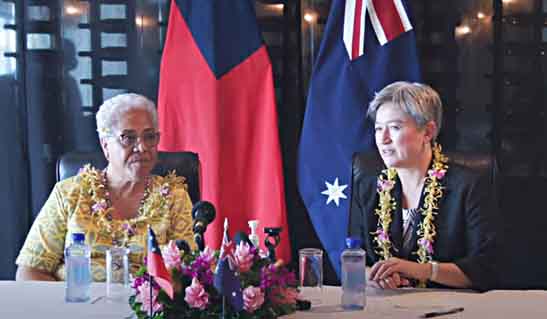By Mataeliga Pio Sioa
Australia’s newly appointed Foreign Affairs Minister, Senator Penny Wong, is in favour of collective rather than sovereign rights for island members when it involves regional security.
Her comments came while in Samoa on a quick swing visit started in Fiji and onwards to Tonga, following closely behind a stop over in Apia last week of China’s Foreign Affairs Minister.
Australia has been making unhappy, worried noises, at the recent security agreement China’s Foreign Affairs Minister signed with the Solomon Islands before traveling to Samoa.
In a joint press conference on Thursday with Samoa’s Prime Minister Fiame Naomi Mataafa, she emphasised the unity in the region of island member states as the Pacific Island family.
“We have consistently taken the view that sovereign nations are sovereign but ultimately have the nature of affecting the security arrangement of the region,” Senator Wong asserted.
She summed up Australia’s position as a ‘ wise intervention,’ that served clear notice at the same time that her country will step in when matters that threaten the security of the region are involved.
A rushed diplomacy tour is the obvious option Australia is taking for now to visit and remind sovereign members of regional unity.
The rush is to counter the impact of China’s Foreign Affairs Minister’s 8-island tour of the Pacific Family members.
Prime Minister Fiame towed the same line of collective rights over the sovereign decision-making responsibilities for individual member countries.
Her reaction was in response to Samoa’s position on China’s security offer for the region.
“ Our position was, you cannot have regional agreement when the region hasn’t met and discuss it, and to be called in to have that discussion and expect a comprehensive outcome for something we could not agree to,” Fiame declared.
“I think we need to meet as a region to consider any proposal that is put to us by our development partners that requires a regional agreement.”
The PM’s reaction suggested that the Solomon Is. has signed up without collective approval, to the security agreement of their own accord to the offer by China.
Australia is drumming up the regional Pacific Family unity to highlight the collective rights as a region rather than as, individual member countries making decisions on their own whether it is their sovereign right or not.
When asked for a reaction, the former Prime Minister and opposition leader Tuilaepa Sailele Malielegaoi, re-emphasised in philosophical terms Samoa’s position during his time, in relations to development partners like China.
“The enemy of my enemy is my friend,” Tuilaepa quoted from an ancient proverb to suggest that in the end the right decision is what benefits the country the most.
He is adamant as well that what a sovereign country decides is their business and no one else.
Tuilaepa told the Australian media when asked for a reaction to the Solomon Is and China security agreement that if the two countries want to be friends it is their business.
“I suspect the unexpected visit by the Australian Foreign Affairs Minister to Samoa was to counter the Chinese Minister’s influence after signing up on the security agreement with the Solomon Is.”
It is more than 40 years since Samoa established official relations with China from 1975 and according to Tuilaepa, it has always made every effort not to get caught up between the politics of the big powers.
“Our efforts are to look at how we can benefit from a few shovels and crowbars they can assist us with our developments, while they do their own politics.
“China has never interfered with our decision making as a sovereign country and we in turn have done the same in all this time we have established relations right up to when I was no longer leader.”
Tuilaepa recalled how China was against having Japan included in the UN Security Council yet it was supported by Samoa in what he cited national interest while addressing the issue at the world organisation.
China accepted Samoa’s position in the same way other member countries in the region like Australia and New Zealand would do if it was for their own national good as well.
‘If it is on national importance to them they will go ahead and do what it takes to do so.”
Tuilaepa brushed aside the reported tension between the bigger countries over the Solomon Is. security agreement as the normal run of big power politics trying to drag in the Pacific Family members.
